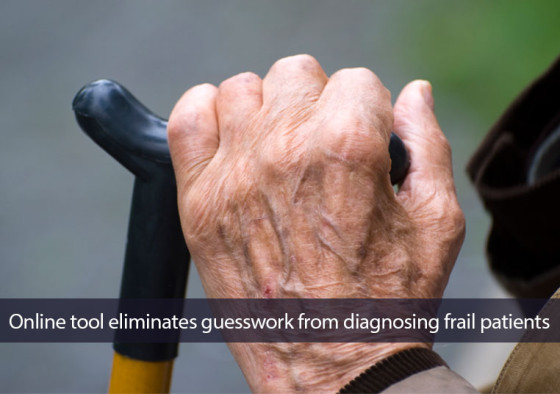Online tool eliminates guesswork from diagnosing frail patients


A standardized, evidenced-based method to assess frailty across clinical and research settings.
The Johns Hopkins Frailty Assessment Calculator
Often defined as a state of increased vulnerability to adverse health outcomes, frailty is an important measurement in clinicians’ treatment of their elderly patients. Frailty is identified using a variety of physical measurements along with questions pertaining to a subject’s activity and energy levels. This approach has led to the development of myriad tools and techniques to gauge and identify what has become a growing concern. In 2009 alone, a study found that approximately 3 to 4 million adults aged 65 and over could be considered “frail.”
Despite the wealth of options available to clinicians, there is little standardization. In addition, frequent modifications to the diagnostic criteria and other oft-cited barriers to accuracy have led to incorrect or ineffective treatment and management of patients. The Johns Hopkins Frailty Assessment Calculator is one of the most commonly utilized and cited clinical decision support tools available, providing a level of consistency and accuracy unrivaled by other frailty tools. Developed by Johns Hopkins clinician Jeremy Walston, MD, the Johns Hopkins Frailty Assessment Calculator defines the condition via measurement of five phenotypic criteria:
- Unintentional weight loss
- Exhaustion
- Low energy expenditure
- Low grip strength
- Slowed walking speed
These criteria are then represented by a single aggregate score on a scale from 0 to 5, with a score of 0 being considered “robust” while a score between 3 or 5 would be classified as “frail.” The Johns Hopkins Frailty Assessment Calculator recognizes the need for standardized, accurate and efficient measurement of frailty in clinical and research settings.
COMPONENTS
The Hopkins Frailty Assessment Toolkit provides clinicians with a robust, full featured tool to measure what is considered an important indicator of risk in older adults. It contains:
- Access to the online Frailty Assessment Calculator
- Training Videos
- User’s Guide
- Frailty Assessment Forms
- Downloadable Access Database to collect, score and store frailty assessment data
Other required components (Not included)
- Dynamometer (Grip Strength Measurement Tool)
- Stop Watch (To time walking speed movement)
- Tape Measure (To lay out 4-meter walking course)
- Stadiometer (Or other height measurement tool)
- Scale for weight measurement
Click here to learn more about the Frailty Assessment Calculator.
LEARN ABOUT THE PROGRAM INNOVATOR
Jeremy Walston, MD received his MD from the University of Cincinnati School of Medicine and completed his General Internal Medicine residency at the Johns Hopkins University. Since completing his residency he has worked with a multidisciplinary team to help develop a program that focuses on the identification of age-related molecular and physiological changes that contribute to frailty and chronic disease states. It was out of these efforts that the Hopkins Frailty Assessment Toolkit was born, to help translate the findings of this team into clinically relevant interventions.
